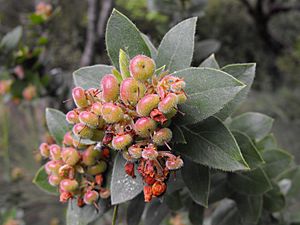Montara manzanita facts for kids
Quick facts for kids Arctostaphylos montaraensis |
|
|---|---|
 |
|
| Conservation status | |
| Scientific classification | |
| Kingdom: | |
| (unranked): | |
| (unranked): | |
| (unranked): | |
| Order: | |
| Family: | |
| Genus: | |
| Species: |
A. montaraensis
|
| Binomial name | |
| Arctostaphylos montaraensis J.B. Roof
|
|
| Synonyms | |
|
Arctostaphylos imbricata Eastw. |
|
The Montara manzanita (scientific name: Arctostaphylos montaraensis) is a special kind of shrub. It's a plant with woody stems that stays green all year round. This unique plant belongs to the manzanita family.
Where Does This Plant Live?
The Montara manzanita is a very rare plant. It grows naturally only in a small part of California. You can find it in northern San Mateo County. Specifically, it lives on San Bruno Mountain and Montara Mountain. These mountains are part of the Santa Cruz Mountains.
This plant likes to grow at heights between 80 and 500 meters (about 260 to 1,640 feet). It prefers rocky areas made of granite and sandstone. It grows in special plant communities called coastal chaparral and coastal sage scrub.
Sadly, the Montara manzanita is a critically endangered plant. This means it's at a very high risk of disappearing forever. The California Native Plant Society lists it as endangered. Its habitat is threatened by new buildings and people walking or riding vehicles off marked paths.
What Does It Look Like?
The Montara manzanita is a shrub that can grow in different ways. It might be a low, mounding plant or an upright shrub. It can reach heights from 0.5 meters (about 1.6 feet) on rocky spots to 5 meters (about 16 feet) tall.
Its many trunks and stems have a deep reddish-brown bark. The new branches and flower stalks are covered in tiny, sticky hairs. The shrub has many leaves that are a light gray-green color. They feel rough and dull, and can be up to 4 or 5 centimeters (about 1.5 to 2 inches) long.
The flowers grow in dense clusters. Each flower is cone-shaped and white, just under a centimeter long. They have tiny bristles inside. Montara manzanita plants usually bloom from January through March.
After flowering, the plant produces small, red fruits. These fruits look a bit like tiny apples. In Spanish, "manzanita" means "little apple." The fruits are about 6 to 7 millimeters (about 0.2 to 0.3 inches) wide.
Growing Montara Manzanita
People sometimes grow Montara manzanita in gardens. It's a good choice for chaparral landscaping. It's also popular for California native plant gardens. This plant is great because it can handle dry conditions, so it doesn't need much water. It's also used in natural habitat gardens.
 | Jackie Robinson |
 | Jack Johnson |
 | Althea Gibson |
 | Arthur Ashe |
 | Muhammad Ali |


